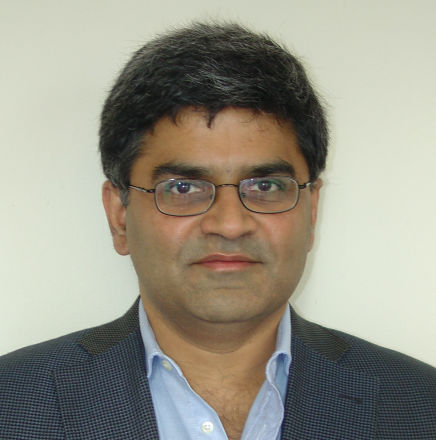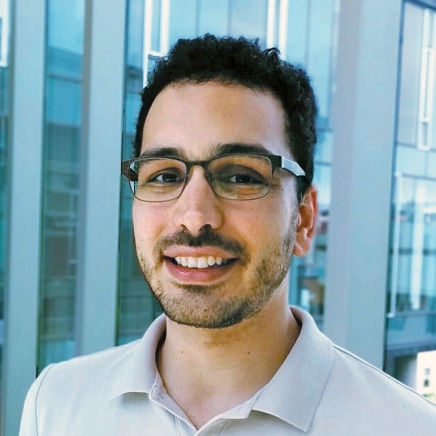GrAPL 2019: Workshop on Graphs, Architectures, Programming, and Learning
Hilton Rio de Janeiro Copacabana
Rio de Janeiro, Brazil
20 May 2019
Scope and Goals:
GrAPL is the result of the combination of two IPDPS workshops
- GABB: Graph Algorithms Building Block
- GraML: Workshop on The Intersection of Graph Algorithms and Machine Learning
Data analytics is one of the fastest growing segments of computer science. Much of the recent focus in Data Analytics has emphasized machine learning. This is understandable given the success of deep learning over the last decade. However, many real-world analytic workloads are a mix of graph and machine learning methods. Graphs play an important role in the synthesis and analysis of relationships and organizational structures, furthering the ability of machine-learning methods to identify signature features. Given the difference in the parallel execution models of graph algorithms and machine learning methods, current tools, runtime systems, and architectures do not deliver consistently good performance across data analysis workflows. In this workshop we are interested in Graphs, how their synthesis (representation) and analysis is supported in hardware and software, and the ways graph algorithms interact with machine learning. The workshop’s scope is broad which is a natural outgrowth of the wide range of methods used in large-scale data analytics workflows.
The objectives of this workshop are as follows:
- Understand data analytics workflows and the mix of graph and machine learning algorithms they require
- Understand the synergies between evolving device technology and graph analytics applications to drive: 1) the direction of emerging hardware and software architecture, 2) new graph analytics algorithms that better exploit the emerging hardware; and 3) application workflows that mix the large graph synthesis and analytics and machine learning.
- Explore different frameworks, languages and libraries to support programming graph analytics and machine learning algorithms
- Evaluate the performance and scalability of integrated platforms for large graph synthesis and analysis, and machine learning
While each of these topics on their own are well addressed in other workshops, we are particularly interested in the cross-cutting synergies. For example, hardware and software architectures specialized for machine learning (and in particular deep learning) may be poorly suited for graph algorithms. Can we understand these conflicting needs and perhaps find an architecture jointly optimized for both?
This workshop seeks papers on the theory, model-based analysis, simulation, and analysis of operational data for graph analytics and related machine learning applications. We are particularly interested in papers that:
- Discuss hardware platforms specialized for addressing large, dynamic, multi-attributed graphs and associated machine learning;
- Discuss programming models and associated frameworks such as Pregel, Galois, Boost, GraphBLAS, GraphChi, etc., for building large multi-attributed graphs;
- Discuss how frameworks for building graph algorithms interact with those for building machine learning algorithms;
- Discuss the problem domains and problems addressable with graph methods, machine learning methods, or both;
- Provide tractability performance analysis in terms of complexity, time-to-solution, problem size, and quality of solution for systems that deal with mixed data analytics workflows.
Besides regular papers, papers describing work-in-progress or incomplete but sound, innovative ideas related to the workshop theme are also encouraged.
Location:
 This workshop is co-located with IPDPS 2019, held 20-24 May 2019, at the Hilton Rio de Janeiro Copacabana, Rio de Janeiro, Brazil. Registration information for IPDPS2019 can be found at here.
This workshop is co-located with IPDPS 2019, held 20-24 May 2019, at the Hilton Rio de Janeiro Copacabana, Rio de Janeiro, Brazil. Registration information for IPDPS2019 can be found at here.
Program:
Keynote Talk 1:
Single-Machine Analytics on Massive Graphs Using Intel Optane DC Persistent Memory
Keshav Pingali (University of Texas at Austin)
Graph analytics systems today must process very large graphs that have billions of nodes and edges and require several TB of storage. Since the main memory of most computers is limited to a few 100 GB, graphs of this size must be processed either on clusters or by out-of-core processing. However, both these approaches have large overheads and they support only a limited set of graph processing algorithms.
Intel Optane DC Persistent Memory is a transformative memory technology which has higher density and lower cost than DRAM, but which can be accessed efficiently at the byte level like DRAM. This enables affordable machines with several TB of memory. In this talk, we describe our experience in using such a machine for in-memory analytics of massive graphs using the Galois system.

Keshav Pingali is a Professor in the Department of Computer Science at the University of Texas at Austin, and he holds the W.A."Tex" Moncrief Chair of Computing in the Oden Institute at UT Austin. Pingali is a Fellow of the IEEE, ACM and AAAS. He received the IIT Kanpur Distinguished Alumnus Award in 2013. Between 2008 and 2011, he was the co-Editor-in-chief of the ACM Transactions on Programming Languages and Systems. He has also served on the NSF CISE Advisory Committee.
Keynote Talk 2:
Graph Representation Learning: Where Probability Theory, Data Mining, and Neural Networks Meet
Bruno Ribeiro (Purdue University)
My talk starts by turning back the clock to 1979-1983, introducing the ideas that culminated with the fundamental representation theorem of graphs (the Aldous–Hoover theorem). I will then show how these ideas connect to a probabilistic interpretation of matrix factorization methods, explaining why matrix factorization is fundamentally not as expressive as it could be to describe finite graphs. I will then turn to early machine learning attempts to represent graphs and how these attempts connect to graph mining algorithms. I will introduce the concept of representation learning with graph neural networks (GNNs) and explain its connections to statistical graph models and the Weisfeiler-Lehman isomorphism test. Finally, I will introduce a newly proposed general framework for graph representation learning using deep neural networks, which is directly rooted in the ideas that gave us the Aldous–Hoover representation theorem. This new representation framework points to novel graph models, new approaches to make existing methods scalable, and provides a unifying approach connecting matrix factorization, graph mining algorithms, and graph neural networks. I will end my talk with a few open problems.

Bruno Ribeiro is an Assistant Professor in the Department of Computer Science at Purdue University. He obtained his Ph.D. at the University of Massachusetts Amherst and did his postdoctoral studies at Carnegie Mellon University from 2013-2015. His research interests are in deep learning and data mining, with a focus on sampling and modeling relational and temporal data.
Invited Talk:
Graph Mining with Deep Learning: challenges and pitfals
Ana Paula Appel (IBM Research, Brazil)
Deep learning is widely use in several cases with a good match and accuracy, as for example images classifications. But when to come to complex networks there is a lot of problems involved, for example how do we represent a network in a neural network without lost node correspondence? which is the best encode for graphs or is it task dependent? Here I will review the state of art and present the success and fails in the area and which are the perspective. I will also present a novel work done using chimera, an graph mining encoding that allow us to combine link and content overtime to predict and discovery communities in complex networks.

Ana Paula Appel joined IBM Research Brazil in February 2012 and since January 2018, She is in Visual Analytics and Insight group at IBM Research Brazil. The group's mission is to conduct research projects in data-driven aiming to develop novel technologies that can help in several industries as Finance, Agriculture and Natural Resources. She is a master inventor since 2016, member of AOT since 2017 and a Certified Master Data Science since 2019. In 2011, She worked as a professor at the Computer Science Department at Federal University of Espirito Santo (CEUNES - UFES), Brazil, in Database and Data Mining area. During this period she also did a post-doc at UFSCar under the guidance of Prof. Dr. Estevam Hruschka. Before that, she received a Ph.D. (2010) and a Master Degree (2004) in Computer Science from the University of São Paulo under the guidance of Prof. Dr. Caetano Traina Jr. She also, did one year internship at Carnegie Mellon University (CMU) under the supervision of Prof. Dr. Christos Faoutsos.
Her research interests lies in machine learning and data mining, more specifically: temporal data, graph mining, graph and deep learning, financial models and risk analyses. She is active in the machine learning and data mining research communities, having being organizing WinDS - Women in Data Science in the past three edition (2017, 2018 and 2019). She also served in the program committees of the ACM International Conference on Knowledge Discovery and Data Mining (ACM-KDD), Brazilian Conference on Intelligent Systems (BRACIS), Symposium on Knowledge Discovery, Mining and Learning (KDMILE) and Simposio Brasileiro de Banco de Dados (SBBD), among others.
| Time | Event |
|---|
| 8:30 - 8:45 | Welcome and Introduction |
| 8:45 - 9:45 | Keynote 1 Single-Machine Analytics on Massive Graphs Using Intel Optane DC Persistent Memory Prof. Keshav Pingali (UT Austin) |
| 9:45 - 10:15 | Coffee Break |
| 10:15 - 11:55 | Session: Graph Analytics - Infrastructures & Algorithms You've Got Mail: Building Missing Asynchronous Communication Primitives Benjamin Priest, Trevor Steil, Roger Pearce and Geoffrey Sanders Graph Coloring on the GPU Muhammad Osama, Minh Truong, Carl Yang, Aydin Buluç and John Owens Delta-stepping SSSP: From Vertices and Edges to GraphBLAS Implementations Upasana Sridhar, Mark Blanco, Rahul Mayurnath, Daniele G. Spampinato, Tze Meng Low and Scott McMillan Distributed Kronecker Graph Generation with Ground Truth of Many Graph Properties Trevor Steil, Benjamin Priest, Geoffrey Sanders, Roger Pearce, Timothy La Fond and Keita Iwabuch |
| 11:55 - 1:00 | Lunch |
| 1:00 - 2:00 | Keynote 2 Graph Representation Learning: Where Probability Theory, Data Mining, and Neural Networks Meet Prof. Bruno Ribeiro (Purdue University) |
| 2:25 - 2:50 | Session: Session: Graphs & Machine Learning Compound Analytics using Combinatorics for Feature Selection: A Case Study in Biomarker Detection Ronald Hagan, Brett Hagan, Charles Phillips, Bradley Rhodes and Michael A. Langston RadiX-Net: Structured Sparse Matrices for Deep Neural Networks Ryan Robinett and Jeremy Kepner |
| 2:50 - 3:30 | Coffee Break |
| 3:30 - 4:15 | Invited Talk Graph Mining with Deep Learning: challenges and pitfalls Dr. Ana Paula Appel (IBM Research, Brazil) |
| 4:15 - 5:00 | Session: Graph Analytics Frameworks LAGraph: A Community Effort to Collect Graph Algorithms Built on Top of the GraphBLAS Tim Mattson, Timothy A. Davis, Manoj Kumar, Aydin Buluc, Scott McMillan, Jose Moreira and Carl Yang RedisGraph GraphBLAS Enabled Graph Database Pieter Cailliau, Jeremy Kepner and Tim Davis |
Details and Dates
To submit a paper, upload a PDF copy here:
https://easychair.org/conferences/?conf=gabb19
Submitted manuscripts may not exceed ten (10) single-spaced double-column pages using 10-point size font on 8.5x11 inch pages (IEEE conference style), including figures, tables, and references (see IPDPS Call for Papers for more details). All papers will be reviewed. Proceedings of the workshops are distributed at the conference and are submitted for inclusion in the IEEE Xplore Digital Library after the conference.
- Submissions due: February 10, 2019 EST 23:59pm
- Notification: February 25, 2019
- Final Camera-Ready Manuscript due: March 22, 2019
Workshop Organizers:
Chairs:
- Tim Mattson, Intel Corp.
- Antonino Tumeo, Pacific Northwest National Laboratory
Program committee members (in addition to the chair):
- Aydin Buluç, LBNL, US
- Timothy A. Davis, University of Florida, US
- Jana Doppa, Washington State University, US
- John Gilbert, University of California at Santa Barbara, US
- Oded Green, Georgia Institute of Technology & NVIDIA, US
- Jeremy Kepner, MIT, US
- Arif Khan, PNNL, US
- Hao Lu, ORNL, US
- Kamesh Madduri, The Pennsylvania State University, US
- Rupesh Nasre, IIT Madras, IN
- John Owens, University of California, Davis, US
- Arnau Prat, Universitat Politècnica de Catalunya, ES
- Jason Riedy, Georgia Institute of Technology, US
- P. Sadayappan, The Ohio State University, US
- A. Erdem Sarıyüce, University at Buffalo, US
- Arun Sathanur, PNNL, US
- Brian Van Essen, LLNL, US
- Flavio Vella, Free University of Bozen, IT
- Yangzihao Wang, Tencent, CN
- Marinka Zitnik, Stanford University, US
- Jaroslaw Zola, University at Buffalo, US
Steering committee:
- David A. Bader (Georgia Institute of Technology)
- Aydın Buluç (LBNL)
- John Feo (PNNL)
- John Gilbert (UC Santa Barbara)
- Mahantesh Halappanavar (PNNL)
- Jeremy Kepner (MIT Lincoln Labs)